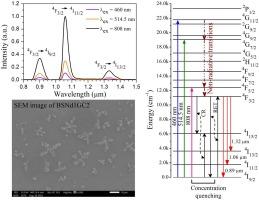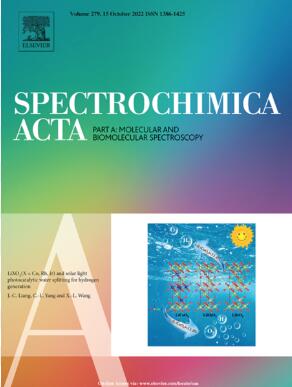Nd3+-doped B2O3-SiO2-AlF3-NaF-CaF2 glass ceramics for 1.06 μm emission
IF 4.6
2区 化学
Q1 SPECTROSCOPY
Spectrochimica Acta Part A: Molecular and Biomolecular Spectroscopy
Pub Date : 2024-11-09
DOI:10.1016/j.saa.2024.125405
引用次数: 0
Abstract
Trivalent neodymium (Nd3+) doped transparent oxyfluoroborosilicate glass and glass ceramics (GCs) comprising CaF2 nanoparticles (NPs) were fabricated via melt quench route followed by two step heat treatment process. The X-ray diffraction and scanning electron microscopic studies confirm the presence of CaF2 NPs. The GC environment for efficient luminescence was obtained at a heat treatment of 450 °C/1 h. The wavelength of pumping laser source was optimized as 808 nm by studying the luminescence properties at different excitations. The Nd3+ ions exhibit their characteristic emission transitions with peak maxima at around 0.89 μm (4F3/2 → 4I9/2), 1.06 μm (4F3/2 → 4I11/2) and 1.32 μm (4F3/2 → 4I13/2). The Nd3+ concentration was also optimized as 1.0 mol% for strong emission up on 808 nm pumping. Various spectroscopic, radiative and laser characteristic parameters were determined using Judd–Ofelt theory. The luminescence decay of 4F3/2 state was studied controlling the excitation and emission wavelengths at 808 and 1060 nm, respectively. The reasons for quenching in luminescence were discussed with suitable illustrations. The experimentally observed results confirm that the GC sample obtained at 450 °C/1 h heat treatment was highly appropriate to design 1.06 μm fiber lasers and optical amplifiers.

用于 1.06 μm 发射的掺钕 B2O3-SiO2-AlF3-NaF-CaF2 玻璃陶瓷。
通过熔融淬火工艺和两步热处理工艺,制备了掺杂三价钕(Nd3+)的透明氧氟硼硅酸盐玻璃和含有 CaF2 纳米粒子(NPs)的玻璃陶瓷(GCs)。X 射线衍射和扫描电子显微镜研究证实了 CaF2 NPs 的存在。通过研究不同激发下的发光特性,优化了泵浦激光源的波长为 808 nm。Nd3+ 离子在 0.89 μm(4F3/2 → 4I9/2)、1.06 μm(4F3/2 → 4I11/2)和 1.32 μm(4F3/2 → 4I13/2)处显示出其特有的发射转变峰值。Nd3+ 浓度也优化为 1.0 摩尔%,以便在 808 纳米泵浦上发出强光。利用 Judd-Ofelt 理论确定了各种光谱、辐射和激光特性参数。研究了 4F3/2 状态的发光衰减,激发和发射波长分别控制在 808 纳米和 1060 纳米。通过适当的插图讨论了发光淬灭的原因。实验观察结果证实,在 450 °C/1 h 热处理条件下获得的 GC 样品非常适合设计 1.06 μm 光纤激光器和光放大器。
本文章由计算机程序翻译,如有差异,请以英文原文为准。
求助全文
约1分钟内获得全文
求助全文
来源期刊
CiteScore
8.40
自引率
11.40%
发文量
1364
审稿时长
40 days
期刊介绍:
Spectrochimica Acta, Part A: Molecular and Biomolecular Spectroscopy (SAA) is an interdisciplinary journal which spans from basic to applied aspects of optical spectroscopy in chemistry, medicine, biology, and materials science.
The journal publishes original scientific papers that feature high-quality spectroscopic data and analysis. From the broad range of optical spectroscopies, the emphasis is on electronic, vibrational or rotational spectra of molecules, rather than on spectroscopy based on magnetic moments.
Criteria for publication in SAA are novelty, uniqueness, and outstanding quality. Routine applications of spectroscopic techniques and computational methods are not appropriate.
Topics of particular interest of Spectrochimica Acta Part A include, but are not limited to:
Spectroscopy and dynamics of bioanalytical, biomedical, environmental, and atmospheric sciences,
Novel experimental techniques or instrumentation for molecular spectroscopy,
Novel theoretical and computational methods,
Novel applications in photochemistry and photobiology,
Novel interpretational approaches as well as advances in data analysis based on electronic or vibrational spectroscopy.

 求助内容:
求助内容: 应助结果提醒方式:
应助结果提醒方式:


